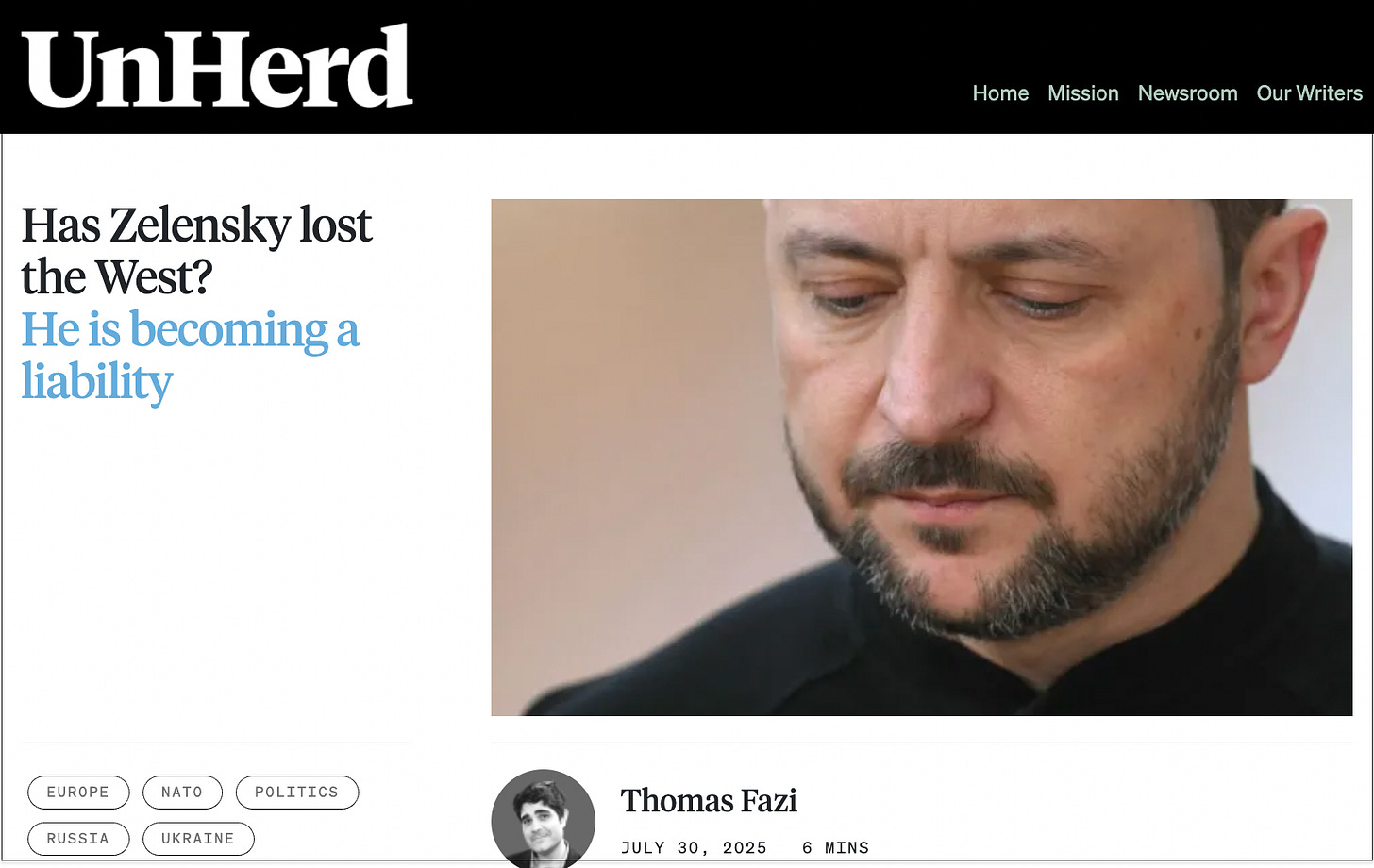Is the West cutting Zelensky loose?
Why is the Western establishment suddenly turning against Zelensky, after lionising him, whitewashing the appalling human rights situation in Ukraine and smearing critics for the past three years?
I’ve written for UnHerd about the anti-Zelensky protests that swept Ukraine last week and why the Western establishment is suddenly turning against the Ukrainian president — after lionising him, whitewashing the appalling human rights situation in Ukraine and smearing critics for the past three years. We’re told this is because Zelensky, by threatening the independence of the country’s anti-corruption agencies, crossed a line that his Western backers — and ordinary Ukrainians — simply could not ignore. But this explanation makes little sense. Why did Ukrainians, who have tolerated far more unpopular government actions since the start of the war, choose to protest now? Why did the political-media Western establishment so energetically back the demonstrations, after years of shielding Zelensky against any opposition, both domestically and throughout the West (over much more serious issues)? And why did Zelensky even move against the agencies in the first place?
The scale and intensity of the protests were surprising in many respects. Since February 2022, Zelensky’s government has implemented deeply unpopular measures — from extending martial law to shuttering opposition parties and media outlets — without triggering comparable public unrest. These measures have been used not only to centralise power but also to neutralise any dissenting voices that might challenge his government’s “war‑at‑all‑costs” policy, by framing any questioning of the latter as unpatriotic or even treasonous. In this way, measures initially justified as temporary wartime necessities have been instrumentalised to entrench executive authority and suppress alternative perspectives on Ukraine’s future.
Corruption, meanwhile, has long been endemic in Ukraine and has only worsened during the war. […]
Yet, so far, this had not sparked significant protests, doubtless because over the past three and a half years, demonstrating against government policies or even voicing dissenting opinions has become deeply risky Opposition media and parties have been banned, government critics jailed or driven into exile, and “problematic” political figures — such as Kyiv’s former chief peace negotiator — have been assassinated under murky circumstances. As a former Zelenskyy minister put it: “This is the logical culmination of tightening the screws at home. The new narrative is simple: you’re either with Zelenskyy or you’re a Russian agent”. […]
The Council of Europe has recently condemned Ukraine for “reported instances of alleged intimidation and other forms of harassment of Ukrainian journalists, lawyers, civil society, political and opinion leaders critical of the government”. Forced mobilisation, or gang-pressing, has also become widespread. […]
Given such widespread repression, it is hardly surprising that Ukrainians have refrained from protesting until now. The anti-corruption issue, however, was different. It could not easily be framed as unpatriotic or “pro-Russian” because, if anything, the agencies are the antithesis of Russian influence. The National Anti-Corruption Bureau of Ukraine (NABU) and the Specialized Anti-Corruption Prosecutor’s Office (SAPO) were established in 2015 as part of Ukraine’s post-Maidan reform commitments. Western governments tied financial aid, debt relief and EU visa liberalisation to the creation of these “independent” anti-corruption bodies insulated from Ukraine’s notoriously politicised Prosecutor General’s Office. […]
This also helps explain the vehemence of the Western response. The issue was arguably less about concern for Ukraine’s endemic corruption — which has long been tolerated — than about Zelensky’s attack on institutions of Western influence.
Could there be more at play? Zelensky’s move against NABU and SAPO came hard on the heels of several attacks, launched via various Western mainstream media outlets that had previously lauded him. But, as noted above, these realities have been evident for a long time. Until recently, however, anyone who dared to speak openly in the West about Ukraine’s appalling human rights situation and growing public resentment — including Ukrainian critics — was routinely ignored, smeared, threatened or silenced. So why is the Zelensky narrative changing?
Read the article here. If you’re a paid subscriber and can’t access the article, write to me at thomasfazi82@gmail.com.
Putting out high-quality journalism requires constant research, most of which goes unpaid, so if you appreciate my writing please consider upgrading to a paid subscription if you haven’t already. Aside from a fuzzy feeling inside of you, you’ll get access to exclusive articles and commentary.
Thomas Fazi
Website: thomasfazi.net
Twitter: @battleforeurope
Latest book: The Covid Consensus: The Global Assault on Democracy and the Poor—A Critique from the Left (co-authored with Toby Green)




My only interest in this whole debacle is the war ends, lines are drawn and ukraine ( what's left of it) and Russia and the western Ukrainian Russian speaking folks settle down and go grocery shopping in peace. Let's bring this war to and end and see what happens from there.